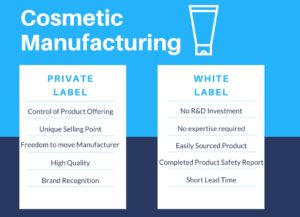White Label Vs Private Label
If you are at the formative stages of your cosmetic product development journey, you may consider going down the private or white label route. There are several key considerations you must make before making your decision.
What is White Labelling?
White labelling is done when a third party is contracted to manufacture one of their own formulations under their clients brand name. Here, a company has control over how the product is packaged and the branding behind it; however, they have no control over what goes into the cosmetic product.
Clients who choose the white labelling route do not need an extensive understanding of ingredients and product composition. They benefit from the expertise the manufacturer has developed by producing this product. This manufacturing method is perfect for small firms who want to sell branded items but don’t have the resources to invest in R&D in order to develop their own formulas.
Here at Contract Formulations, we have various off-the-shelf formulations available for clients to use for their own brand. These are fantastic products made of quality ingredients. These white-label products can be sourced quickly with no minimum order quantity. Cosmetic products must comply with specific regulations to be sold on the European market. Therefore, all of Contract Formulations stock formulations have completed Cosmetic Product Safety Reports and are produced in a Good Manufacturing Practice (GMP) 22716:2007 and Quality Management System 9001:2015 certified facility. The ready-to-go formula, completed safety assessment, and easily sourced ingredients result in a reduced lead time, meaning your company can get a hold of new products ASAP, allowing brands to bring new products to the market quickly.
What is Private Labelling?
Private labelling is done when a third party manufactures a brands cosmetic formulation, and this product is sold under a brand name. In this case, a brand has complete control over the cosmetic product, its ingredients, the packaging and the branding.
Because a private label product is unique to a specific brand, the manufacturer must build an entire process to create and develop a private label product. These private label products typically have a unique selling point related to the ingredients, packaging or brand values.
 Private labelling is an appropriate route for a company that has the resources to develop their own product and a vision for a cosmetic product’s function, texture, smell and appearance but don’t have the facilities to develop, test and manufacture it themselves. A company in this position would benefit from working with a private labelling manufacturer, such as Contract Formulations, to help develop the project from concept to commercialisation. This process may begin at the formulation stage of the product development journey, where an entrepreneur may book a consultation with our formulations chemist and new product development officer. During this consultation, consumer trends, ingredients and product specifics are discussed. As private label cosmetic product formulations are unique to each brand, the ingredients used in these products may drive the brand’s unique selling point. For example, seaweed is well known for its natural healing properties. It has been used as a key ingredient in several skincare products, which acts as a unique selling point and drives brands apart from the competition.
Private labelling is an appropriate route for a company that has the resources to develop their own product and a vision for a cosmetic product’s function, texture, smell and appearance but don’t have the facilities to develop, test and manufacture it themselves. A company in this position would benefit from working with a private labelling manufacturer, such as Contract Formulations, to help develop the project from concept to commercialisation. This process may begin at the formulation stage of the product development journey, where an entrepreneur may book a consultation with our formulations chemist and new product development officer. During this consultation, consumer trends, ingredients and product specifics are discussed. As private label cosmetic product formulations are unique to each brand, the ingredients used in these products may drive the brand’s unique selling point. For example, seaweed is well known for its natural healing properties. It has been used as a key ingredient in several skincare products, which acts as a unique selling point and drives brands apart from the competition.
A company may wish to pursue private labelling rather than white labelling if they aspire to produce the product themselves at some point in the future. When a private label product is created, the formula is owned by the brand therefore, the brand has the freedom to move manufacturing whenever they please.
When changing manufacturing facilities, it is essential that the new facility has the capabilities to produce a brand’s unique product to the same quality that is expected of the brand. It is also necessary to ensure that the manufacturer has the quality practices and capabilities in place to comply with the brand’s values and claims, such as Vegan, organic, Fairtrade and EcoCert. For example, at Contract Formulations, we are GMP and Quality Management System certified, which demonstrates that quality is intrinsic in all manufacturing and production processes. These accreditations also provide us with a strong foundation when applying for other certifications, as many quality procedures are already in place. These processes have ensured we can get certificates that our client’s products must comply with, such as Organics trust and Soil Association certs.
 To find out how we can tailor our services to suit your product development journey and business needs contact us for more information.
To find out how we can tailor our services to suit your product development journey and business needs contact us for more information.
